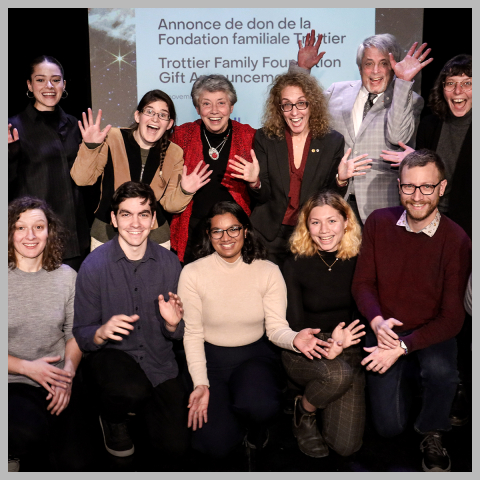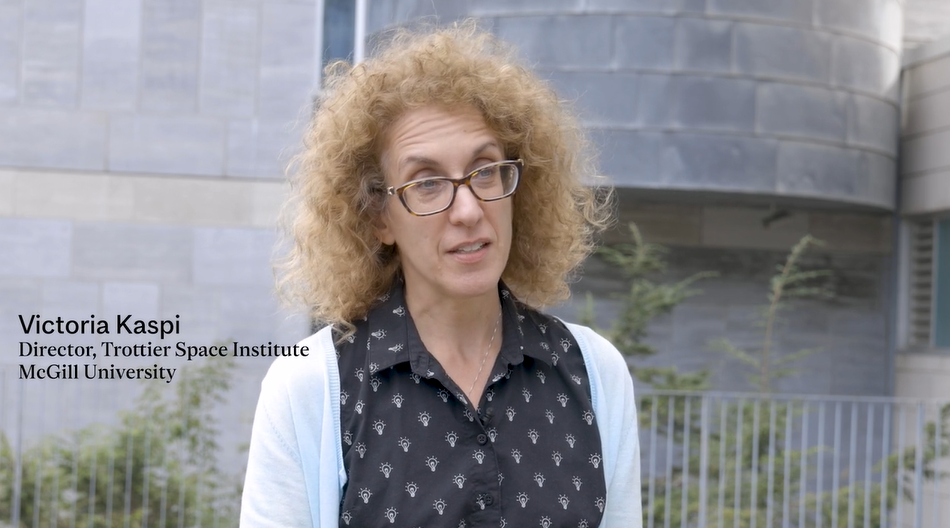To infinity and beyond: $26 million to propel space research at McGill University and Université de Montréal to the outer limits

The McGill Space Institute (MSI) and the Institute for Research on Exoplanets (iREx) at Université de Montréal are at the forefront of the exhilarating pace of space research, helping to advance our knowledge of extrasolar planets, fast radio bursts, the dark universe, and other extraterrestrial mysteries. Now their stellar work and efforts to recruit top students and researchers are getting a huge boost thanks to extraordinary gifts to McGill University and the Université de Montréal from the Trottier Family Foundation.
The visionary gifts, which total $26 million, coincide with an exciting age of discovery in astrophysics, thanks in part to the development of powerful new telescopes – such as the Canadian Hydrogen Intensity Mapping Experiment (CHIME) and James Webb Space Telescope (JWST) – that enable researchers to explore deep into our solar system and beyond. In addition to advancing our understanding of the universe, space research has contributed to the development of transformative technologies that have greatly benefitted society, including communication satellites, GPS, high-performance cameras, and high-speed wireless internet.
Trottier Space Institute at McGill University
The McGill Space Institute will receive $16 million, of which half will go towards the construction of an annex to the Institute’s current building on University Street. The other portion of the gift will be used to fund graduate and postdoctoral fellowships, as well as to expand on existing programmatic and research support. The ground-breaking work by the Space Institute’s researchers includes major discoveries in the area of neutron stars and fast radio bursts by Professor of Physics and Director of the Institute Victoria Kaspi, an award-winning astrophysicist who holds the Lorne Trottier Chair in Astrophysics and Cosmology at McGill.
In recognition of this historic gift, the McGill Space Institute will be renamed the Trottier Space Institute at McGill.
Trottier Institute for Research on Exoplanets at Université de Montréal
For its part, Université de Montréal’s Institute for Research on Exoplanets will receive $10 million to ensure the sustainability of its activities. Leaders in exoplanet research, iREx scientists have made discoveries that profoundly changed what we know about worlds beyond our solar system. Led by astrophysicist René Doyon, a Professor of Physics and the Canadian Principal Investigator of the James Webb mission, iREx has developed major scientific instruments, including an infrared camera that has captured remarkable and previously unseen images of space. In addition, iREx devotes great effort to sharing knowledge with the general public. The Trottier Family Foundation’s major gift will allow iREx’s scientific team to continue its research to discover life outside the solar system. In recognition of this exceptional donation and the support of Lorne Trottier and the Trottier Family Foundation since its inception, iREx will be renamed the Trottier Institute for Research on Exoplanets.
“These devoted researchers scanning our skies have already broadened our horizons in a big way,” said UdeM rector Daniel Jutras. “Probing the mysteries of the universe, they have helped us come to recognize the beauty and fragility of our planet. The unprecedented support for Montreal scientists offered by Mr. Trottier and the Trottier Family Foundation will also help preserve our ecosystems here on Earth. It’s a gift that will continue to enrich future generations.”
“We are very grateful to McGill alumnus Lorne Trottier and the Trottier Family Foundation, whose tremendous contributions to McGill and to its Faculties of Science and Engineering over many years have helped further our understanding of our world and our universe,” said McGill’s Interim Principal and Vice-Chancellor, Christopher Manfredi. “This most recent gift, spread out among two of our city’s great universities, will cement Montreal’s place as a leading hub of space research within Canada and the world.”
“The Trottier Family Foundation is pleased to support the world-class work of the Trottier Space Institute at McGill and the Trottier Institute for Research on Exoplanets at the Université de Montréal,” said Lorne Trottier, the co-founder of Matrox, an industry leader in computer graphics, imaging and video products. “Science has brought untold benefits to humanity,” added Trottier, who noted astronomy was the first science. “Copernicus, Galileo and Newton laid the groundwork for the scientific revolution that’s transformed lives in so many ways. Understanding more about the laws of the universe and its origins leads to discoveries and innovations that are beneficial – in addition to satisfying our deep curiosity.”
With a lifelong love of science and technology, Lorne Trottier earned bachelor and master’s degrees in Engineering at McGill and has received several honorary degrees, including from McGill and the Université de Montréal. His family foundation has supported exoplanet research at iREx at the Université de Montréal and provided support to many key institutions on the island of Montreal. The foundation has supported astronomy education for youth across Canada and funds various initiatives promoting Science, Technology, Engineering and Mathematics (STEM) throughout Canada.
The Trottier Family Foundation’s generosity has made an indelible mark on McGill, including the Lorne M. Trottier Building on campus that bears his name, the creation of institutes in the Faculties of Science and Engineering and support for popular public education initiatives.
The Trottier Space Institute has flourished since its creation in 2015 with support from the Trottier Family Foundation. The interdisciplinary centre brings together researchers in Astrophysics, Planetary Science, Atmospheric Sciences, Astrobiology and other space-related areas at McGill. McGill researchers have detected thousands of fast radio bursts and identified magnetars as one likely origin of this mysterious phenomenon, helped make the first image of a black hole using the Event Horizon Telescope, and developed a microbial life detection system for space missions.
Since its inception in 2014, UdeM’s Trottier Institute for Research on Exoplanets successfully recruited more than 60 of the world’s most renowned researchers in a variety of domains of expertise related to the search for and understanding of alien worlds beyond our solar system. Over the years, the members of iREx have made major advances in astrophysical research, including, in 2019, the first detection of water on a planet, K2-18 b, in the habitable zone of the star it orbits, and in 2022, the discovery of a candidate “ocean planet,” TOI-1452 b, that made headlines around the world. Researchers from iREx are also leaders in the conception and development of cutting-edge astronomical instruments that have been sent to world-class telescopes all over the globe and in space.
Watch the video:
About McGill University
Founded in Montreal, Quebec, in 1821, McGill University is Canada’s top ranked medical doctoral university. McGill is consistently ranked as one of the top universities, both nationally and internationally. It is a world-renowned institution of higher learning with research activities spanning three campuses, 11 faculties, 13 professional schools, 300 programs of study and over 39,000 students, including more than 10,400 graduate students. McGill attracts students from over 150 countries around the world, its 12,000 international students making up 30% of the student body. Over half of McGill students claim a first language other than English, including approximately 20% of our students who say French is their mother tongue.
About Université de Montréal
Deeply rooted in Montreal and dedicated to its international mission, Université de Montréal is a leading research university worldwide and among the five best French-language universities. With its affiliated schools, Polytechnique Montréal and HEC Montréal, UdeM attracts over $500 million in research funding every year, making it one of Canada’s top university research hubs. UdeM has close to 70,000 students, 2,300 professors and researchers, and an active global network of 450,000 alumni.


